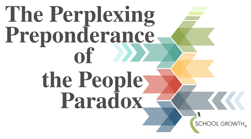 March is a frenetic time of year for educators, and I'm not just talking about college basketball's version of March Madness™ with Cinderella upset stories and incessant variations of the tune, "One Shining Moment." Picking the winners on your Tournament Challenge bracket isn't the real madness that is driving your school crazy. It's far worse than that!
March is a frenetic time of year for educators, and I'm not just talking about college basketball's version of March Madness™ with Cinderella upset stories and incessant variations of the tune, "One Shining Moment." Picking the winners on your Tournament Challenge bracket isn't the real madness that is driving your school crazy. It's far worse than that!
The March Madness in K-12 schools (and higher ed for that matter) is far more of a crisis because the personnel decisions of school administrators and school boards--starting around March and over the next 90 days--will determine the future trajectory of your students, your school, and your quality of life next year.
Why do we do this to ourselves? What is the cause of this perplexing preponderance of the people paradox?
Face the Brutal TQ Facts
People really are the most valuable asset of a school. When prompted to specifically define “high performing,” however, administrators have to face the brutal fact that the percentage of high quality faculty in their Talent Quotient (TQ) is actually only 20-25%. That's not surprising when you consider that on average (based on School Growth's data and analysis over the last eight years), administrators spend less than .4% of their annual budget on faculty recruiting and less than 5% of their work week investing constructively in their faculty.
If you want to know more about your TQ or don't have an effective performance rubric, check out the School Growth Talent & Team Workshop. You can learn both in one day and have the clarity to make better personnel decisions, improving your quality of life as a leader and creating a brighter future for your students.
Stop the Madness
We have a bad habit in K-12 leadership that destroys faculty and overall school culture. Schools are the only organizations of which I am aware that will inform an employee that they are essentially fired (aka, non-renewed), and yet allow that person to continue working with their clients (aka, students and parents) for an extended period of time. I guarantee that Google, Apple, Disney, not even your local grocery store would make such an unhealthy management decision. But this destructive habit is exercised every spring in most schools. That's March Madness!
You will most likely have to continue this industry-wide habit, so take the steps to develop your communication and culture strategies wisely. If you know how to engage with difficult conversations and manage difficult people, you're more likely to navigate these situations without negatively impacting the school. Equip yourself with the right training and tools to produce the best results.


